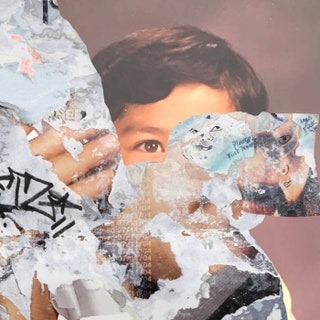Brooklyn-based musician Kam Tambini layers roaring guitars, Latin rhythms, and his own low-pitched, sighing vocals to explore the mundanity of city life.
No city has ever saved 33-year-old Kam Tambini, better known as Tambino, from the exhaustion of 21st-century existence. The clave rhythms that pepper his new Sin Miedo EP stem from Tambini’s childhood in Bogotá, Colombia and his birthplace of Lima, Peru, while his distorted guitars, clattering drum machines, and glistening synths recall cramped Brooklyn venues where the sound guy is learning on the job. Tambini’s blend of shoegaze, indie pop, and electronic touches on everywhere he’s been, but his sound isn’t as simple as his own label for it, “cumbiagaze.” Its charm lies in the way he layers roaring guitars, Latin rhythms, and his own low-pitched, sighing vocals to explore the mundanity of city life. He sounds drained but resilient: Sin Miedo is a reminder of the pockets of contentment in the most frustrating of modern eras.
On “NY Daze,” Tambini unleashes a slow-moving tidal wave of overdriven power chords and deadpans, “Some are getting out of here/I won’t leave New York City, ’cause/Kids, I’m in it/’Til the end.” He sounds anything but convinced, and the rest of Sin Miedo presents a familiar citydweller’s dilemma: Can you feel consistently worn down by a place, yet enchanted enough to stay? On opener “Estos Dias,” Tambini paints a picture that could be inspired by any U.S. city in summer 2020: “Estos días/A miles ví/En las calles de marfil” (“These days/I saw thousands/In the marble streets”). His chorus chant of “Nos mata la policia” (“The police are killing us”) sounds resigned, yet his double-time percussion and bursting guitars feel inspired enough to join the crowd. Even when he’s emotionally worn thin, he finds a glimmer of hope.
Sin Miedo sounds somewhat, though not entirely, clearer and more mobile than 2020’s Tambino EP (both produced by Michael Beharie), and the faint lucidity elevates the moments when Tambini most strongly feels the weight of it all. “Standing on the corner/I can’t speak/Drunks on the subway,” he quasi-raps in the background of “Las Tardes,” nearly indiscernible through the whirring guitars underlying his brief yet vivid description of a metropolitan Friday night. “It’s all coming down on my head,” he continues, his mumble emphasizing his rapidly diminishing emotional capacity. The music cycles between stretches of rapid low-E string plucking and swirls of icy synths accompanied by shaking maracas, all sides of his upbringing in the mix: Wherever he goes, there he is.
Tambini reports his reflections with honest yet simple words—the kind that likely don’t go through any revisions after he writes them down—and his groaning guitars and vocal production suggest a foggy mindstate. So when the crystalline keys and clipped vocal samples of “Deseo” break through, it’s shocking. Click-clacking, reggaeton-tinged percussion dances around chilly synths and Tambini’s echoing, ever-detached voice: “Bailabamos/Con el trago y mi dolor/Yo te daría mi vida” (“We were dancing/With a drink and my pain/I would give you my life”). It’s a new sound for Tambino and a classic city picture: Strong feelings lost to the club yet still present in the morning.



0 comments:
Post a Comment